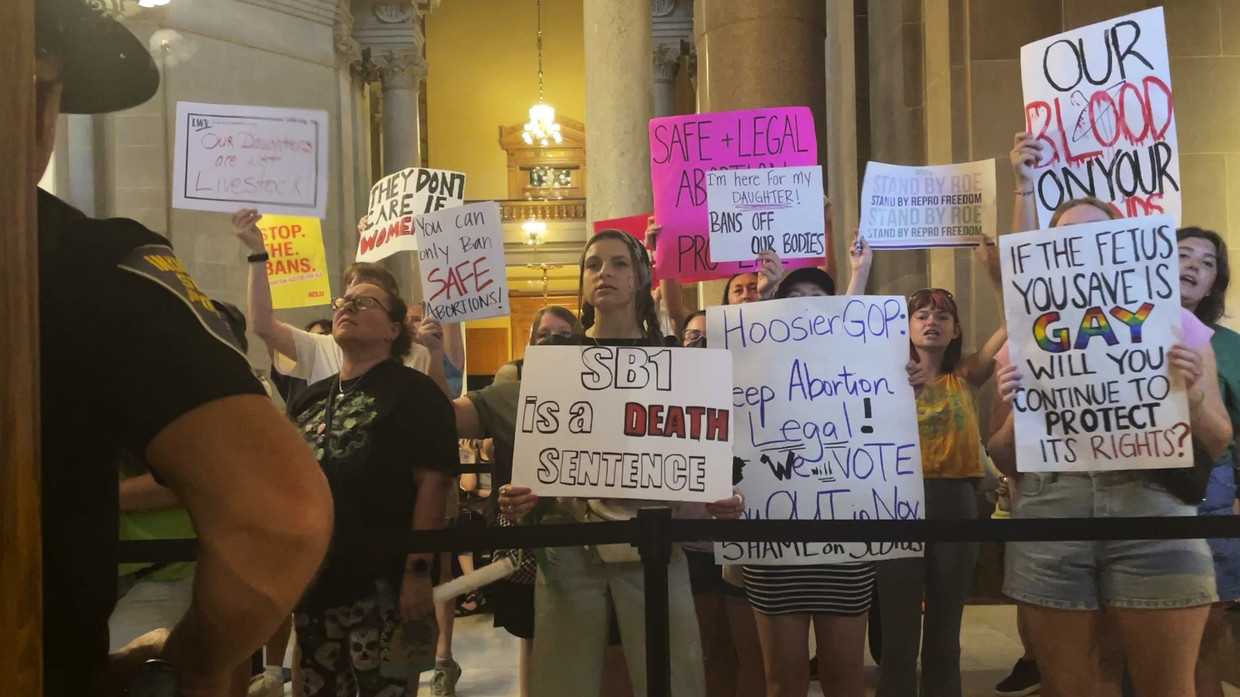The US government on Saturday described a new ban on almost all abortions in the state of Indiana as “devastating,” and called on Congress to make abortion access a legal right nationwide.
Indiana Governor Eric Holcomb signed the ban into law on Friday, after it passed both chambers of the Republican-controlled state legislature. The law, which takes effect on September 15, outlaws all abortions except in cases of rape and incest, where the mother’s life is in danger, or if an unborn baby is diagnosed with a fatal abnormality.
Hospitals will be the only locations allowed to perform the procedures, meaning the state’s seven abortion clinics will be shut down. Doctors who perform illegal abortions will lose their medical licenses.
White House Press Secretary Karine Jean-Pierre described the law’s passage as a “devastating step” and “another radical step by Republican legislators to take away women’s reproductive rights and freedom.”
“Yesterday’s vote, which institutes a near-total abortion ban in Indiana, should be a signal to Americans across the country to make their voices heard,” Jean-Pierre continued. “Congress should also act immediately to pass a law restoring the protections of Roe – the only way to secure a woman’s right to choose nationally,” she concluded.
Congress has never passed a law permitting abortion, and states historically set their own policies on the issue. That situation changed in 1973 when the Supreme Court ruled in the case of Roe v. Wade that the Constitution’s right to privacy covered a woman’s right to terminate her pregnancy.
Combined with later case law, Roe v. Wade allowed abortions to be performed without “undue burden,” a legal standard that abortion advocates and opponents fought bitterly over until the Supreme Court overturned the ruling in June, returning abortion law to the state level. Writing the majority opinion, Justice Samuel Alito argued that Roe v. Wade rested on an “egregiously wrong” and “exceptionally weak” interpretation of the Constitution.
Indiana’s new legislation is the first post-Roe ban on abortion to be approved by a state legislature and become law. West Virginia lawmakers opted to delay passage of a similar bill last month, while voters in Kansas chose last week not to remove the right to abortion from the State Constitution.
Some 13 US states had so-called ‘trigger bans’ on their books, meaning that most abortions instantly became illegal, or a countdown was set toward illegality, the moment that Roe v. Wade was overturned. Accordingly, abortion is now banned in all cases with no exceptions in ten states, while a further two – Idaho and the above-mentioned Indiana – will soon impose similarly hardline bans. Three more states have implemented bans after six weeks of pregnancy, while Florida has banned the procedure after 15 weeks. All of these bans and restrictions have been challenged by pro-abortion activists.
Jean-Pierre’s call to Congress will likely go unheeded. An attempt to codify and expand Roe v. Wade’s protections into law failed in May, and even if the Senate’s 50 Democrats were united in supporting such a bill, they would still be short of the 60-vote majority needed to overcome unanimous opposition from the upper chamber’s 50 Republicans.
President Joe Biden has said that he would support ending the Senate’s 60-vote filibuster rule solely to pass this legislation.


